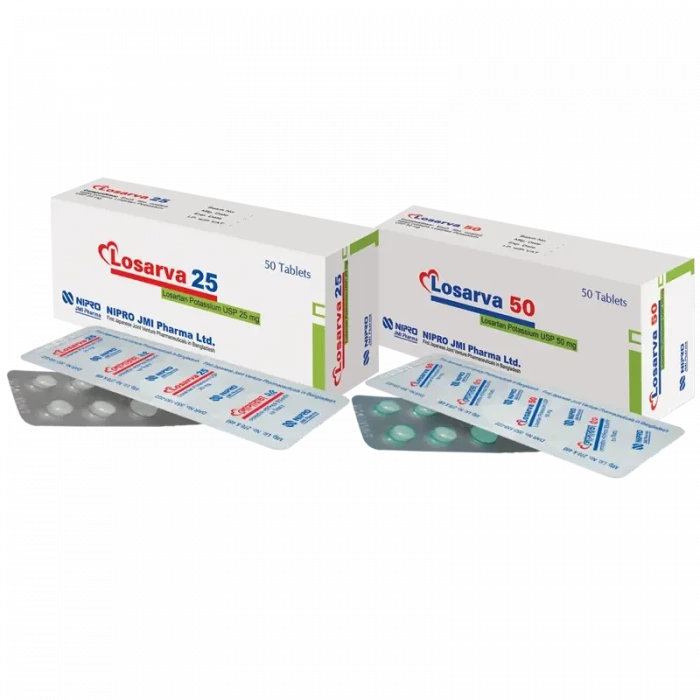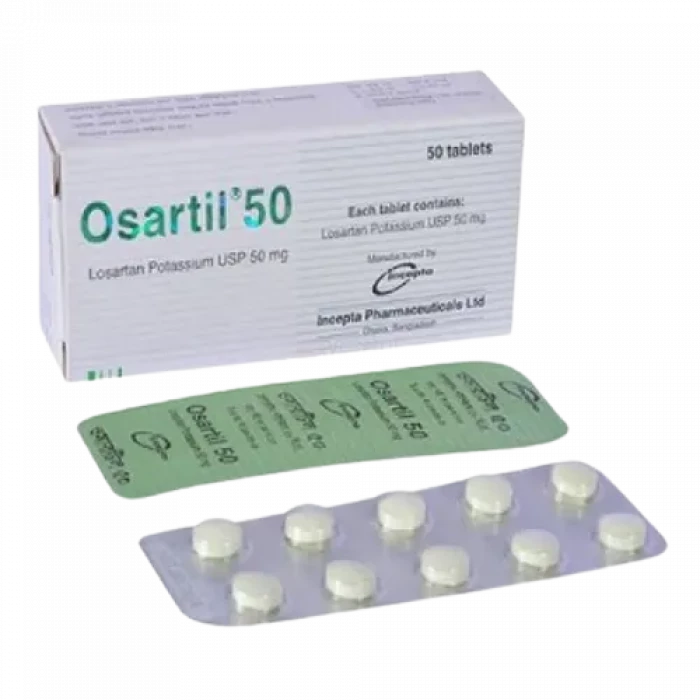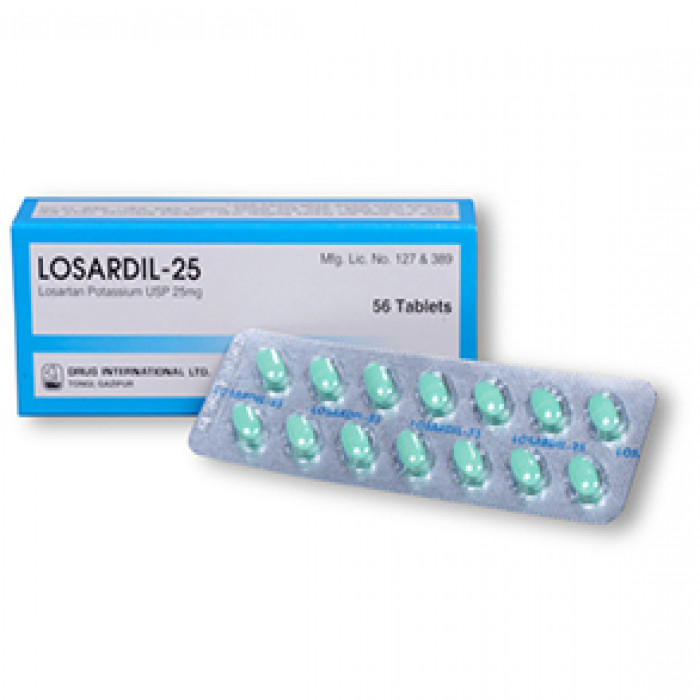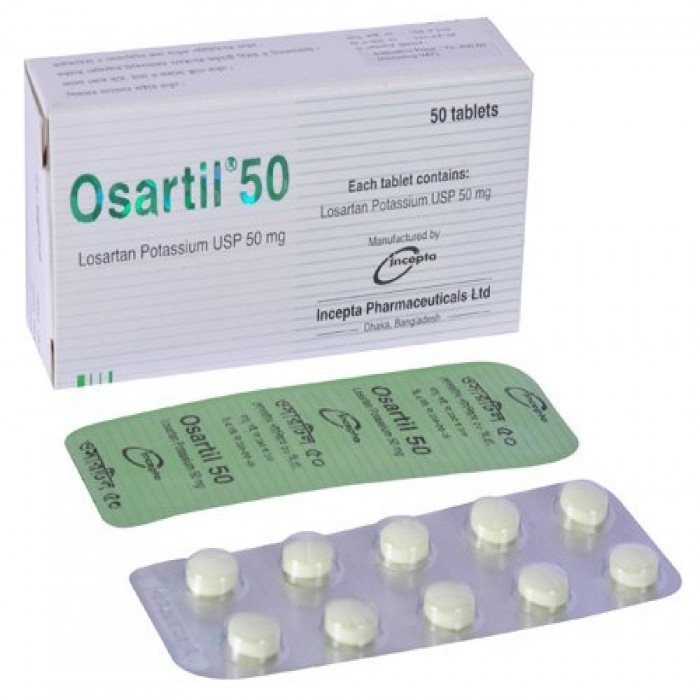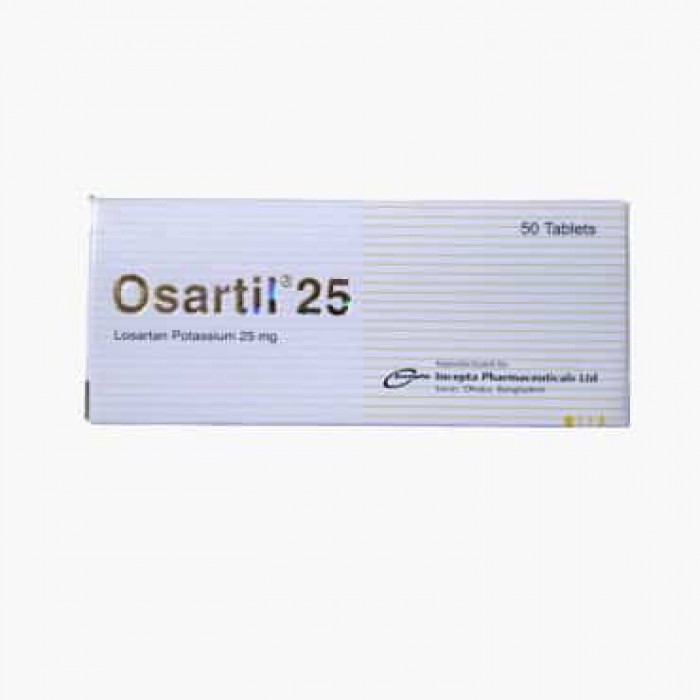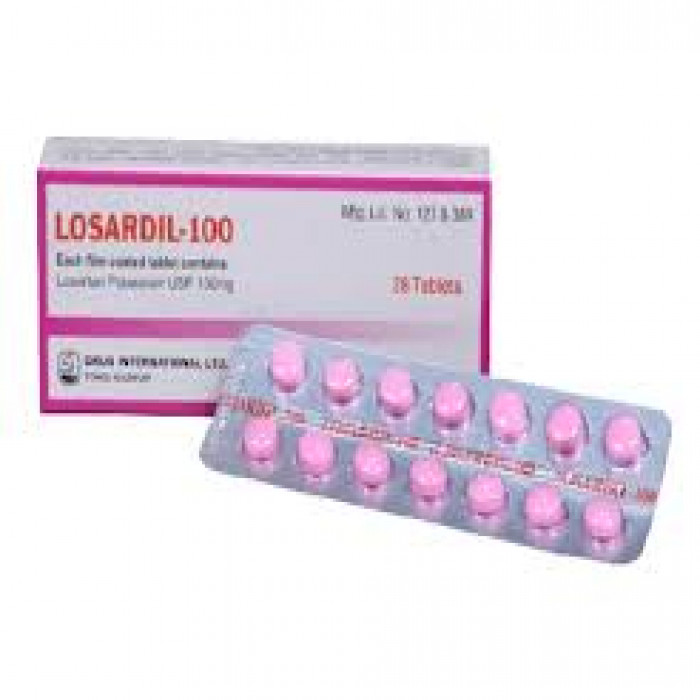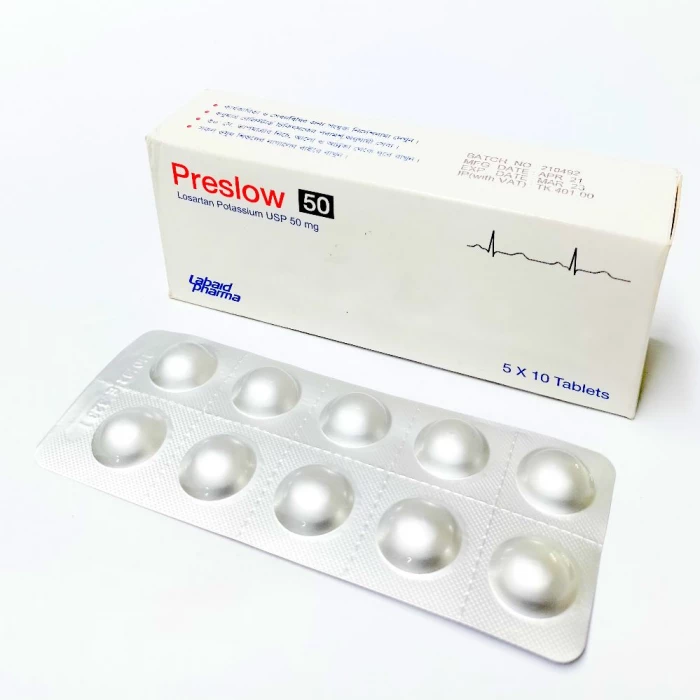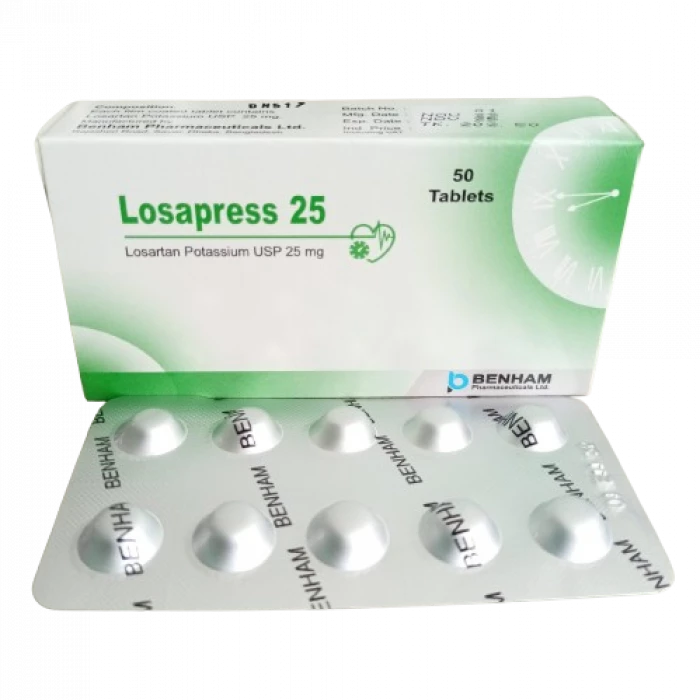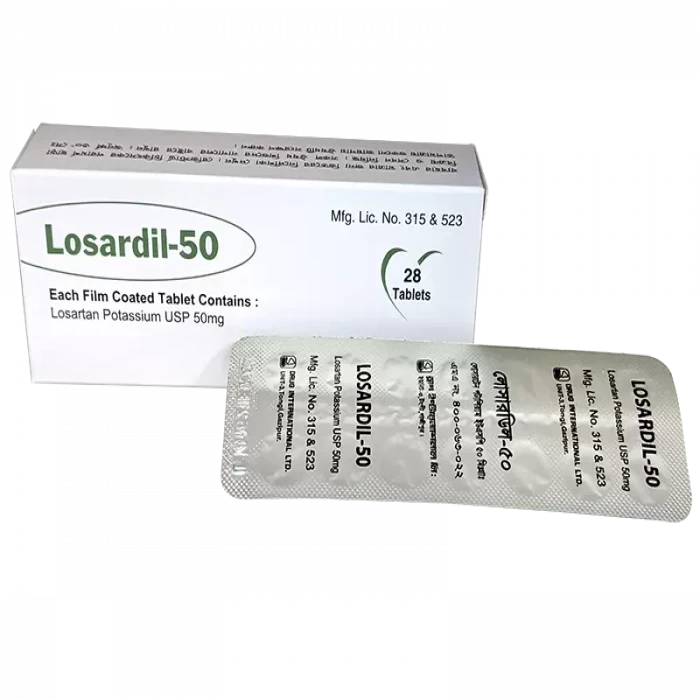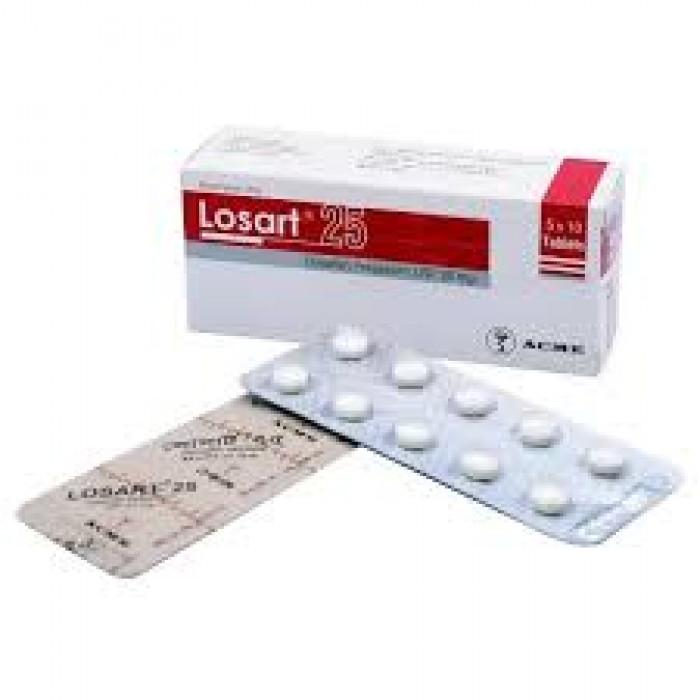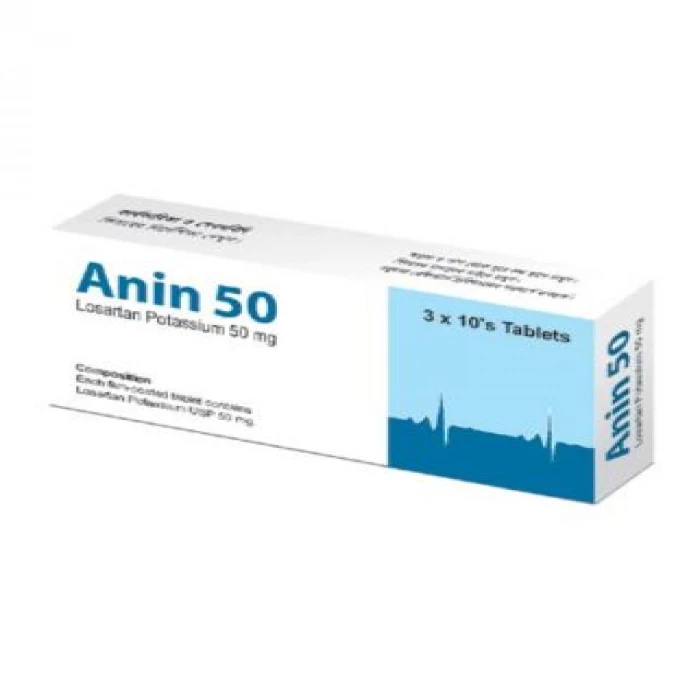
✔ 100% Authentic Product
👁️ Currently Viewing 2139
Osartil 25 (50pcs Box)
Generic Name: Losartan Potassium 25mg
Company Name: Incepta Pharmaceuticals Ltd
Discount
Price: ৳ 238
MRP:
৳
250
5%
Off

100% Genuine Products, Guaranteed

Safe & Secure Payments, Always

Fast, Secure & Efficient Delivery

Proper Packaging
 Cash on Delivery - All over Bangladesh
Cash on Delivery - All over Bangladesh Regular Delivery - 12-24 Hours, Dhaka City* Charge Tk.39-59
Regular Delivery - 12-24 Hours, Dhaka City* Charge Tk.39-59 Regular Delivery - 24-48 Hours, Other Cities* Charge Tk.99-110
Regular Delivery - 24-48 Hours, Other Cities* Charge Tk.99-110
🌙 রমযান অফার 🌙
 ফ্রি ডেলিভারিঃ - ৭৯৯ টাকা+ অর্ডারে, ঢাকা
শহরে
ফ্রি ডেলিভারিঃ - ৭৯৯ টাকা+ অর্ডারে, ঢাকা
শহরে ফ্রি ডেলিভারিঃ - ২৭৯৯ টাকা+ অর্ডারে, ঢাকার
বাহিরে
ফ্রি ডেলিভারিঃ - ২৭৯৯ টাকা+ অর্ডারে, ঢাকার
বাহিরে
📲 মোবাইল অ্যাপ অর্ডারে সাশ্রয় বেশী
-
Google Play Store থেকে ডাউনলোড
-
Apple Store থেকে ডাউনলোড
100% Genuine Products, Guaranteed
Safe & Secure Payments, Always
Fast, Secure & Efficient Delivery
Proper Packaging
 Cash on Delivery - All over Bangladesh
Cash on Delivery - All over Bangladesh Regular Delivery - 12-24 Hours, Dhaka City* Charge Tk.39-59
Regular Delivery - 12-24 Hours, Dhaka City* Charge Tk.39-59 Regular Delivery - 24-48 Hours, Other Cities* Charge Tk.99-110
Regular Delivery - 24-48 Hours, Other Cities* Charge Tk.99-110 ফ্রি ডেলিভারিঃ - ৭৯৯ টাকা+ অর্ডারে, ঢাকা
শহরে
ফ্রি ডেলিভারিঃ - ৭৯৯ টাকা+ অর্ডারে, ঢাকা
শহরে ফ্রি ডেলিভারিঃ - ২৭৯৯ টাকা+ অর্ডারে, ঢাকার
বাহিরে
ফ্রি ডেলিভারিঃ - ২৭৯৯ টাকা+ অর্ডারে, ঢাকার
বাহিরে- Google Play Store থেকে ডাউনলোড
- Apple Store থেকে ডাউনলোড
🌙 রমযান অফার 🌙
📲 মোবাইল অ্যাপ অর্ডারে সাশ্রয় বেশী
✅ Description:
Indications
A medication called Osartil 25 is used to treat heart disease and excessive blood pressure. Blood pressure reduction aids in reducing the risk of future heart attacks and strokes. Using this medication can help diabetic patients maintain kidney function.
Pharmacology
The first orally active angiotensin II receptor blocker that is not a peptide is losartan potassium. It binds to the AT1 receptor, which is found in many tissues (including the heart, kidneys, adrenal gland, and vascular smooth muscle), and inhibits a number of vital biological processes, such as vasoconstriction and the synthesis of the hormone aldosterone, which is responsible for hypertension.
Potassium losartan is used to treat hypertension. It can be taken either on its own or in combination with other antihypertensive drugs (eg. thiazide diuretics).
In hypertensive type 2 diabetics with proteinuria—defined as urine albumin to creatinine ratio of more than 300 mg/g—losartan potassium is recommended as a treatment to halt the progression of renal damage.
Dosage & Administration
For the majority of patients, the beginning and maintenance dose is 50 mg once daily. Prior to raising the dose, 25 mg twice daily is advised if the antihypertensive impact of 50 mg once daily is insufficient. A starting dose of 25 mg once daily should be taken into consideration for individuals with intravascular volume-depletion (such as those on high-dose diuretics). One or two doses of losartan potassium can be given each day. 25 mg to 100 mg is the range for the total daily dose.
Interaction
Losartan Potassium active metabolite levels are reduced by rifampicin and fluconazole. Concurrent usage of Losartan Potassium with hydrochlorothiazide may result in antihypertensive potentiation. Concurrent use of potassium-sparing diuretics (e.g., spironolactone, triamterene, amiloride), potassium supplements, or potassium-containing salt substitutes may result in a rise in serum potassium. Losartan's antihypertensive impact may be reduced by the nonsteroidal anti-inflammatory medication indomethacin. The concurrent use of an ACE inhibitor, an angiotensin receptor antagonist, an anti-inflammatory medication, and a thiazide diuretic raises the risk of renal impairment.
Contraindications
Pregnant women and those who are allergic to any of the product's ingredients shouldn't take losartan potassium. Losartan Potassium shouldn't be used with Aliskiren in diabetic patients.
Side Effects
The negative effects of Losartan Potassium are minor and temporary in nature.
- Stomach discomfort
- Diarrhea
- Dizziness
- Fatigue
- Edema
- Chest Pain
- Nasal congestion
- Decreased blood pressure
- Hypoglycemia (low blood glucose level)
- Increased potassium level in the blood
- Increased blood urea
- and upper respiratory infections are the most prevalent adverse effects.
Pregnancy & Lactation
Pregnancy falls under category D. The risk to the fetus increases if losartan potassium is administered during the second or third trimester of pregnancy. Although it is uncertain whether losartan potassium is excreted in human milk, considering the importance of the medication to the mother, a decision should be made regarding whether to stop nursing or stop taking the medication.
Precautions & Warnings
Losartan Potassium use throughout the second and third trimesters of pregnancy decreases fetal renal function and increases fetal and neonatal morbidity and mortality. Symptomatic hypotension may develop in individuals who are intravascularly volume-depleted (e.g., those on high-dose diuretics). Cirrhotic individuals had substantially higher plasma concentrations of Losartan Potassium. Renal function changes, including renal failure, have been observed in renally impaired patients.
Storage Conditions
Keep away from light and heat in a dry area. Keep out of children's reach.
⚠️Disclaimer:
At ePharma, we’re committed to providing accurate and accessible health information. However, all content is intended for informational purposes only and should not replace medical advice from a qualified physician. Please consult your healthcare provider for personalized guidance. We aim to support, not substitute, the doctor-patient relationship.




